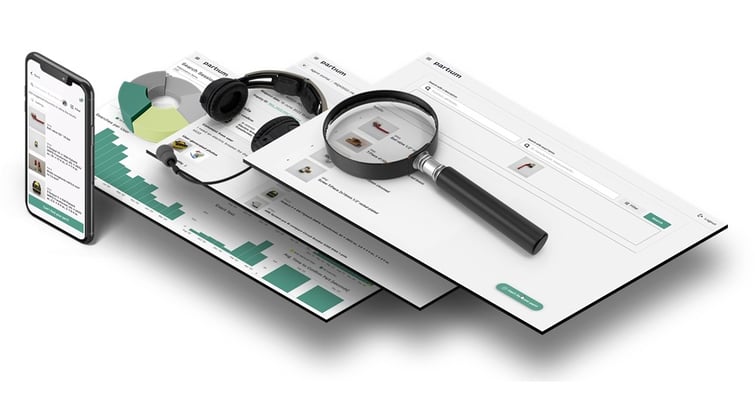MRO Optimization in 2025: Are you Leaving Millions on the Table?
MRO Optimization in 2025: Are You Leaving Millions on the Table?
Learn more about the Partium Suite and how our leading Enterprise Part Search can help you to sell more parts, drive maintenance efficiency, and more!
Whether you want to sell more spare parts, support your parts desk and hotline team, or drive maintenance and warehouse efficiency, Partium can help you.
| Aftersales & Service | |
| Georg Fischer | |
| Maintenance | |
| DB Cargo | |
| DB Fernverkehr | |
| DB DIFa | |
| ÖBB Train Tech | |
| Wien Energie | |
| eCommerce | |
| The Home Depot |

Unlock your Aftermarket & Maintenance Potential with Partium, the easiest and most reliable spare part search.
Transform how technicians search for spare parts, empower your users, and increase part sales & maintenance efficiency.
4 min read
 Christina Angerer
:
Mar 11, 2024 6:54:21 AM
Christina Angerer
:
Mar 11, 2024 6:54:21 AM

Data optimization is a game-changer for B2B environments, offering myriad opportunities to transform operations, drive efficiency, and unlock innovation.
Poor data quality in Business-to-Business (B2B) environments can have significant negative impacts on various aspects of business operations. Here is a list of some common issues associated with bad data quality in B2B environments:
1. Inaccurate Decision Making: Bad data can lead to flawed decision-making processes at all levels of the organization. Whether it's marketing strategies, product development decisions, or financial forecasting, inaccurate data can result in suboptimal choices.
2. Lost Revenue Opportunities: Inaccurate or incomplete data can result in missed sales opportunities. For instance, if customer contact information is incorrect or outdated, sales teams may fail to reach potential clients, resulting in lost revenue.
3. Poor Customer Relationship Management (CRM): B2B relationships often rely heavily on trust and personalized interactions. Incorrect or outdated customer data can lead to misunderstandings, missed communications, and ultimately damaged relationships with clients and partners.
4. Wasted Resources: When data quality is poor, companies may end up wasting time and resources trying to correct errors or reconciling conflicting information. This can include manual data cleaning processes, redundant data entry efforts, or troubleshooting issues arising from inaccurate data.
5. Difficulty in Analytics and Reporting: Reliable data is essential for accurate analytics and reporting. Poor data quality can skew insights, making it challenging to identify trends, patterns, and areas for improvement accurately.
6. Reduced Operational Efficiency: Inaccurate data can disrupt various business processes, including supply chain management, inventory control, and order fulfillment. This can lead to delays, errors, and inefficiencies throughout the organization.
In today's increasingly digitized business landscape, data stands as the cornerstone of success, particularly in B2B environments. As companies strive to remain competitive and meet the evolving demands of their customers, harnessing the power of data and optimizing its utilization has become paramount. This is especially true in various crucial facets of B2B operations, including warehouse management, spare parts optimization, technician support, master data management, and eCommerce. Let's delve into each of these areas and explore how data optimization can drive efficiency and innovation.
Warehouse Optimization:
Efficient warehouse management including spare parts handling is essential for B2B businesses to streamline operations and minimize costs. Data optimization plays a pivotal role in achieving these objectives.
Having several different warehouses can lead to inefficiencies and chaos, resulting in spare parts duplicates, not knowing what parts are in the warehouse, not exactly knowing where in the warehouse the part is stored,… In addition to that, it is more expensive to have several warehouses for each location or workshop.
To consolidate many different warehouses into one professionally and centrally managed warehouse, however, you need to optimize your spare parts data. Technicians have to know in advance what part they are looking for, including the material number, so they can request it from the spare parts supply chain/warehouse teams.
By leveraging AI spare part search & AI data optimization, companies can optimize inventory management, and enhance internal order fulfillment processes. This improves overall operational efficiency and employee satisfaction.
Reduced Spare Part Costs:
For B2B enterprises dealing with complex machinery and equipment, spare parts management can be a significant cost driver. Spare part duplicates are especially a problem. Most companies have on average 10% spare part duplicates in their warehouses - without even knowing it. With AI-based spare part search technologies and data optimization techniques, businesses can tackle de-duplication and subsequential warehouse stock optimization, find alternative vendors, anticipate equipment failures, and maximize machine uptimes.
Supporting Technicians & Experts:
In B2B industries, providing timely support to field technicians and experts is crucial for resolving issues and maintaining customer satisfaction. AI-supported spare part search technologies provide field service technicians with relevant information such as spare part name, number, stock levels,… when being on-site maintaining a machine. Data optimization enables companies to deliver enhanced technical support by leveraging knowledge bases, historical maintenance records, and real-time diagnostic data. By equipping technicians with access to comprehensive data insights and troubleshooting guides, businesses can expedite problem resolution, minimize service disruptions, and enhance customer service levels.
Improved Master Data Management:
Accurate and up-to-date master data, such as product lifecycle information (where has the spare part been purchased, what machine does it belong to, how to recycle it, can you still purchase it, or is it EOL, and logistic information such as dimensions and size) is fundamental for B2B enterprises to operate efficiently and make informed decisions. Data optimization methodologies, such as data cleansing, deduplication, and standardization, are instrumental in ensuring the integrity and reliability of master data repositories. By centralizing and harmonizing data from disparate sources, organizations can eliminate inconsistencies, reduce errors, and enhance data quality. This, in turn, facilitates better decision-making, enhances process efficiency, and enables seamless integration across various business functions.
Better Image Data for eCommerce:
In the digital age, visual content plays a pivotal role in driving sales and enhancing customer engagement in eCommerce environments. For B2B businesses, optimizing image data is crucial for showcasing products effectively and providing accurate representations to customers. By leveraging image recognition technologies and metadata tagging, companies can enhance product discoverability, personalize customer experiences, and improve conversion rates. Moreover, data optimization enables businesses to analyze customer interactions with visual content, derive actionable insights, and refine marketing strategies accordingly.
Data optimization, coupled with the advancements in artificial intelligence (AI), has revolutionized the way businesses leverage their data assets. AI technologies such as machine learning, natural language processing, and computer vision play a significant role in extracting insights, identifying patterns, and automating decision-making processes from vast volumes of data.
One of these solutions is Partium. Partium not only helps you and your teams to find parts faster by using images, text, filters, QR- and barcodes, it also can enrich and enhance your data for you.
Are you curious how it works? Schedule a Discovery Call here and learn more!
Data optimization is a game-changer for B2B environments, offering myriad opportunities to transform operations, drive efficiency, and unlock innovation. Whether it's optimizing warehouse management, reducing spare part costs, supporting technicians, managing master data, or enhancing eCommerce experiences, harnessing the power of data is essential for staying ahead in today's competitive landscape. By embracing data-driven strategies and investing in advanced analytics capabilities, B2B enterprises can unlock new growth opportunities, foster customer loyalty, and achieve sustainable success in the digital era.

MRO Optimization in 2025: Are You Leaving Millions on the Table?

From supporting multiple languages to offering data insights and data enrichment, Partium has experienced an exhilarating 2024 and 2025 is set to...

Artificial Intelligence (AI) is often hailed as a transformative technology, but what does it truly mean for industries like manufacturing,...